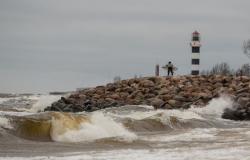
Photo: SHUTTERSTOCK
Prime Ministers are presented to us all in turn as the best of the best. In ministerial positions, parties say that by delegating the best of the best. Each subsequent Saeima is called better than the previous ones. But at the same time, the country is being managed worse and worse. At least this follows not only from the data characterizing the economies of the Baltic states, but also from the conclusions of the study “Foreign Investment Environment Index 2023” conducted by the Riga School of Economics and the Foreign Investors Council in Latvia (FICIL).
A cocktail
Seven ancient names that should not be given to girls
A cocktail
Artificial intelligence names 5 names that attract members of the opposite sex like magnets
Why is the Russian tyrant silent? Putin disappeared after the presidential election
Read other posts
The presentation of the study itself is yet to come, but the conclusions of foreign investors about the situation in Latvia are already known. What are they?
The investment climate in Latvia has reached the lowest value in the assessment of investors in 2023. Investors rated the current work of policymakers in attracting investments as the worst since 2017. The number of investors who plan to invest in Latvia in the future has decreased. Latvia’s competitiveness and the attraction of new investments have been hampered for a long time by the unavailability of labor force, low quality of education, high level of bureaucracy and lack of investment attraction mechanisms. Latvia lacks a long-term vision that would outline a clear strategy for the necessary changes.
The authors of the study emphasize that Latvia’s competitiveness and investment attraction are significantly hindered by the administrative burden. In Latvia, this is caused by a high level of bureaucracy, a lack of coordination between public sector institutions, the absence of measurable goals for those working in state and local government institutions, and a complex regulatory framework. In addition, the administrative burden can be observed in almost all areas – construction, employment, justice system, tax administration, etc.
How is that? Because we have a country of civil servants and not self-initiated rich people. Accordingly, most politicians think about their own well-being and popularity today rather than the long-term overall well-being of the country. This is also clearly confirmed by the way we have presented ourselves to the world, including investors, for a long time.
How did Estonia present itself to the world, including investors, for a long time? “Welcome to Estonia”, “A country of smart e-solutions – small but innovative”, “Ecological paradise”. For comparison – Lithuania: “The center of Europe”, “Lithuania is the heart of the Baltic”, “Lithuania is a brave country”, “Small but loud”. And with what slogans have we promoted Latvia? “Leisure rest in Latvia”, “Land that sings”. Accordingly, such foundations were also laid for the current attitude towards each of the countries. So to speak, relax, sing Latvians in your room while your neighbors express themselves at work…
Perhaps the main reason for this is the fact that in the ruling parties, so to speak, there are people who came from civil service, budget-financed professions. Yes, there are exceptions – both Finance Minister Asheradens and ex-Prime Minister Kariņš have been entrepreneurs, but it was so long ago that, it seems, at least they will forget. The parties in power have also understood that the bulk of their voters are those whose well-being largely depends on the political redistribution of the state budget – seniors (pensioners), teachers, doctors, workers in state administrative institutions or sometimes artificially maintained state-owned enterprises, etc. Accordingly, the priority is the quick indulgence of the groups of voters to be attracted, rather than concern for the country’s sunny future.
What worries the Latvian political leadership the most for a long time? Teachers’ salaries. Medical salaries. Pensions. But above all, it seems that the salaries of those working in leading positions in the state administration are lower than in private business. Whether it is justified or not, it does not matter. Namely, in this situation, work efficiency and intensity are not compared, only the salary figure. It is not surprising that the consequences of such policies are well reflected in the opinions of workers. As sociologist Arnis Kaktiņš recently wrote on Internet public communication sites, “Only about every third (35%) in Latvia currently believes that working in the private sector is better than working in the public sector. This year, 52% recognized the state sector as better, which is more than a year ago, when there was an incomprehensible drop to 47%.”
Here is a schedule of work in the private and public sector.
And such attitude – from the position of civil servants – is, of course, directly reflected in the invention and adoption of various new regulations for business. This is exactly what foreign investors present as a big problem at the moment.
Politicians are sensitive to criticism, they are quick to say that the war is to blame, we are also in a danger zone, so investors distance themselves. Here we have to ask: Lithuania and Estonia are not affected by the threat of war? How is it that the economic indicators are better there? Let’s take a look at some graphs recently published by LDDK expert Jānis Hermanis.
https://twitter.com/J_Hermanis/status/1764724384315342976/photo/1
You can also compare GDP per capita. A decline can also be observed in Estonia and Lithuania at the moment, but both neighboring countries are in a much better position in this respect, they have, so to speak, greater reserves of strength even for a diet cure.
https://www.facebook.com/photo/?fbid=1506046533326401&set=a.102206820377053
https://twitter.com/J_Hermanis/status/1782414637465583983/photo/1 for us, it is bigger than in Lithuania and especially in Estonia.
Accordingly, also debt servicing costs https://twitter.com/J_Hermanis/status/1765066379332567345/photo/1
In terms of the export value of services, in almost all the most important areas (the exception is aviation), we have recently fallen below the indicators of Estonia and Lithuania. Financial services seem especially critical, where after the “overhaul” carried out by Kariņas and Znotiņa, we have experienced a capital crash, while Lithuanians have obviously used and continue to use our self-destructive competitiveness.
Politicians have not even tried to force or motivate banks to lend more intensively to companies, the consequences of which are, of course, visible in lower business competitiveness and weaker growth rates.
It should also be added that along with the “overhaul” in Latvia, mistrust of the bureaucracy towards entrepreneurs, mistrust of the society as such is being cultivated on an unprecedented scale. Everyone is first evaluated as a potential criminal and if the “suspects” cannot prove that they are not, they are rejected. Normunds Bergs, businessman, Chairman of the Board of JSC SAF Tehnikas told a vivid example this week in the TV24 program Kärtības rullis: “Altum has been investigating for two years whether Schneider Electric is in trouble, even though the concern has a profit of one billion euros. There are a thousand companies in the group, and to make sure that no one is in trouble, you need a thousand annual reports. It is endless work. /../ when you don’t see an end to it, pessimism arises.” Berg describes the operation of such state structures as, “for now, all the power has gone in the whistle…”.
In the same program, Kaspars Rožkalns, chairman of the board of the Latvian Exporters’ Association vividly described the bureaucratic processes in Latvia: “listening to Europe, we think that everything needs to be super regulated, we super regulate everything, then we conclude that those regulations cannot be fulfilled at all.
Another important aspect is human resources. Recently, news appeared that more people are returning home to Lithuania than emigrating. The situation in Estonia is also better than here. On the other hand, in Latvia, the demographic balance is temporarily “patched” formally by accepting refugees from Ukraine and attracting students from distant poor countries. Are we farsighted?
What’s more, the liberation of the rural regions of Latvia from people is being continued with particular vigor. “Unprofitable” schools, libraries, post offices, etc. continues to close, the services people need are becoming more and more inaccessible. The leaders of local governments are persecuted, who try not to “learn European money” through general measures that are not really needed by anyone, but to use it in local conditions in proven areas that already create and would create new jobs, keep the workforce in the respective region, attract investments. At the same time, local or imported scandalists still have great opportunities to block investment projects in production, which we have experienced more than once.
These problems and trends have been visible for years. Politicians pretend not to notice them, because it is more pleasant to think about things closer to themselves, about their own comforts, sometimes even feel like an equal among the leaders of Europe’s wealthiest countries, as ex-prime minister Kariņš has confirmed, dreaming of a special residence where the head of government could communicate intimately with foreign colleagues.
As already said, a detailed study by the Council of Foreign Investors and the Riga School of Economics will be available in the coming days. This article uses data from other sources, but they also aptly illustrate the trends that foreign investors are talking about.
I really hope that the latest study by the Council of Foreign Investors and the Riga School of Economics will be like a cold shower for the politicians living in the welfare bubble. And what is even more important – this harsh diagnosis of the situation will not be forgotten tomorrow as a bad nightmare, but will be an incentive to eliminate shortcomings in the near and also further future.
Themes
Tags: Roman Melniks Saeima called previous country managed poorly
-




